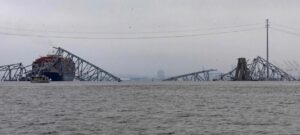 What is known about the bridge collapse in Baltimore after being hit by a cargo ship named “Dali”? What are the implications of the incident? Have any details emerged about the cause? Is there hope for the six individuals reported missing?
What is known about the bridge collapse in Baltimore after being hit by a cargo ship named “Dali”? What are the implications of the incident? Have any details emerged about the cause? Is there hope for the six individuals reported missing?
Updates on the Bridge Collapse
What is known about the bridge collapse in Baltimore after being hit by a cargo ship named “Dali”? What are the implications of the incident? Have any details emerged about the cause? Is there hope for the six individuals reported missing?
Summary of Events
During the night of March 26th, the “Francis Scott Key” bridge in Baltimore, Maryland, was struck by the Singapore-flagged container ship “Dali.” Significant sections of the more than 2.5-kilometer-long bridge collapsed, with heavy steel beams bending from the impact. Several vehicles and individuals fell into the approximately 15-meter-deep waters of the Patapsco River where the bridge meets its end.
Missing Persons and Rescue Efforts
Authorities have reported six individuals still missing, with the possibility that more people may have fallen into the water. The missing individuals, including individuals from Mexico, Guatemala, and El Salvador, were part of an eight-person work crew repairing potholes on the road surface when the bridge collapsed. While two individuals were rescued on Tuesday, the search for the missing continued on Wednesday, with authorities sadly assuming that none of them survived. Search efforts have been challenging due to underwater currents, debris, and poor visibility.
Probable Cause and Investigations
The exact cause of the collision and collapse remains unknown. Authorities have not found any evidence of intentional actions or terrorism. Maryland Governor Wes Moore mentioned a potential issue with the cargo ship’s power supply as it was moving towards the bridge at around eight knots, or approximately 15 kilometers per hour. The vessel reported an engine failure shortly before impact, dropping anchor to slow down. It remains unclear whether efforts were made to warn the work crew on the bridge.
Investigations are underway, with the National Transportation Safety Board (NTSB) examining the ship’s data recorder for insights. Crew members, survivors, and first responders are being interviewed. The NTSB will also assess if contaminated fuel contributed to the vessel’s power loss. Efforts to retrieve bridge parts from the water are ongoing to determine the collapse’s cause.
At this stage, there is no indication that the bridge’s condition, built in the 1970s, contributed to the collapse. Governor Moore affirmed that the bridge met structural standards with no known issues during a press briefing.
Impact of the Collapse
The “Francis Scott Key” bridge was a significant landmark in Baltimore, serving as a daily commuting route for about 31,000 people between Washington and New York. With its loss, traffic disruptions are expected in Baltimore as drivers divert to other congested harbor crossings, causing delays and regional traffic rerouting for months or even years to come.

